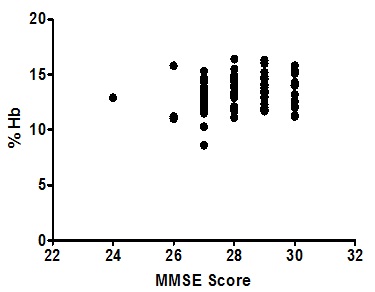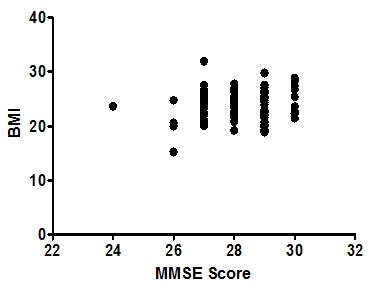Effect of Hb% on Cognitive Skills in UG Medical Students
Ilham Jaleel1, P Saikumar2, PR Devak3
1 Post Graduate Student, Department of Physiology, Sree Balaji Medical College and Hospital, Chrompet, Chennai, India.
2 Professor and HOD, Department of Physiology, Sree Balaji Medical College and Hospital, Chrompet, Chennai, India.
3 Associate Professor, Department of Physiology, Sree Balaji Medical College and Hospital, Chrompet, Chennai, India.
Name, Address, E-Mail Id of The Corresponding Author: Dr Ilham Jaleel, S3, Ruby Mansion, Dharga Road, Zamin Pallavaram, Chennai – 600 043, India.
Phone: +91 98944 28377
E-mail: dr.ilhamjaleel@gmail.com
Introduction: The cognitive functions in adults can be altered by a number of diseases, nutritional deficiencies, hormonal changes, ageing and drugs. Anaemia, through various possible mechanisms, has been suggested to result in a cognitive deterioration.
Aim and Objective: To study the effect of Hb% on cognitive skills of 100 UG medical students of Sree Balaji Medical College and Hospital, Chromepet, Chennai, India.
Methodology: One hundred UG medical students who were in the age group of 17 to 19 years were selected and their Hb% estimations were done by using Drabkin’s method. Their cognitive skills were assessed by using the Mini Mental State Examination (MMSE). Correlation between Hb% and their cognitive skills was done.
Results: This study showed that there was a significant correlation between the Hb concentration and the cognitive skills in the students.
Anaemia, Cognitive skills, MMSE
Introduction
Anaemia is a common nutritional disorder which is prevalent in a developing country like India. It has been proved that nonanaemic children performed significantly better in cognitive function tests than mildly and moderately anaemic children [1]. It has also been found that higher haemoglobin levels results in better CNS functions [2]. Iron deficiency being the most prevalent micro nutrient deficiency, it is the common cause of anaemia, a deficiency of which in children, which results in the alterations on in behaviour and cognitive performance [3]. Studies which have been done on Indian children have shown that iron deficiency anaemia causes lower levels of attention and concentration [4] and that there was a significant improvement in their cognition with iron supplementation [5].
It is well known that iron is essential for the formation of Hb. Hence, Hb deficiency has an effect on the cognitive performance of an individual. Cognitive performance, as measured by the MMSE, varies within the population by age and education [6]. Hence, this study was undertaken, to find out the effect of haemoglobin concentration on cognitive skills in of UG medical students, who have higher level of education when compared to those of common people. Also, this young age group was targeted, as their memory levels were better than those of older age group. When this age group was selected, it was made sure that they were devoid of diseases which affected their cognition, like dementia, etc.
Methods
Approval was obtained from the institutional ethical committee and informed consents were obtained from all the students. The study population included 100 UG medical students who were in the age group of 17 years to 19 years. Both male and female students who belonged to similar socioeconomic status were recruited. Those students who were on haematinic therapy were excluded from the study. Students who were having jaundice or, any haematologic disorder, and those who suffered from acute or chronic diseases were also excluded from the study. Students who were on long – term medications and who had hearing abnormalities were also not included in the study.
The Hb% of the students was estimated by using the standard Drabkin’s method, at the Central Lab, SBMCH, Chrompet, Chennai, India. Their cognitive skills were evaluated by using the MMSE scale and scoring was done. MMSE scale is a brief, 30 point questionnaire which is used to screen the cognitive impairment. The MMSE scale was designed by Folstein et al. It samples functions which include arithmetic, memory and orientation within 10 minutes.
Statistical Analysis
Correlation between Hb% and the MMSE scores was done by using Spearman’s Rho correlation co – efficient with a p value of <0.05 was considered as significant.
Results
It was found that the correlation between Hb% and the MMSE scores to be was highly significant [Table/Fig-1 and 2].
Comparison of hb% and MMSE scores
| Parameter | Hb% |
|---|
| No of XY Pairs | 86 |
| Spearman r | 0.35 |
| 95% confidence interval | 0.14 to 0.53 |
| p value (two tailed) | 0.0009 |
| p value summary | *** |
| Exact or app p value? | Gaussian approximation |
| Is the correlation significant? | Yes |

Correlation between BMI and MMSE scores was also done and it was found to be insignificant [Table/Fig-3 and 4].
Comparison of BMI and MMSE scores
| Parameter | BMI |
|---|
| No of XY pairs | 88 |
| Spearman r | 0.13 |
| 95% of confidence interval | -0.088 to 0.34 |
| p value (two tailed) | 0.2293 |
| p value summary | Ns |
| Exact or app p value? | Gaussian approximation |
| Is the correlation significant? | No |

Discussion
In this study, it was seen that lower the Hb concentration, lesser was the MMSE score. MMSE was chosen to assess the cognitive skills, because the various components of the cognition, namely, registration, attention and calculation, recall, language and praxis could be assessed easily and also within a short span of time, about ten minutes. It is thereby evident, that Hb% of an individual does affect his/her cognitive skills. Anaemia affects cognition by its direct neurochemical effect and by its indirect effect on behaviour, where children become less attentive and less responsive.
Iron is seen throughout the white matter in the brain but the highest concentration is in the basal ganglia [7]. Direct neurochemical effect by which anaemia affects cognition has been explained after a number of considerable work studies. The possible mechanism by which iron deficiency anaemia affects cognition is by causing a decrease in the iron concentration in the brain, which causes a reduction in the neurotransmitter levels [8]. This, in turn, causes impaired transmitter functions, leading to hypomyelination and delayed neuromaturation. Animal studies have shown that iron deficiency in rats, in the early developmental stages, causes electrophysiological changes, decrease in the number of dopaminergic D2 receptors, altered neurotransmitter functions which leads to persistent behavioural changes, all due to a deficiency of in the iron concentration in the brain [9].
In this study, the Hb% of individuals was compared with their respective MMSE scores. It was observed that those individuals who had lower hemoglobin had relatively lesser MMSE scores when compared to those with higher haemoglobin levels. This showed that there was a significant correlation between both the parameters, which indicated Hb% did affect the cognitive skills. The BMIs of the individuals were also correlated with their MMSE scores, which showed that the correlation was not significant. Studies have shown that overweight and obese persons were not likely to be anaemic as compared with to normal weight persons [10].
Conclusion
If haemoglobin concentration does affect the cognitive skills, even in medical students, this has to be seriously looked upon and anaemia has to be prevented and treated as early as possible. Further studies takeing different parameters and their associations with haemoglobin into consideration, are required for a future validation.
[1]. Handa Ruchika, Effect of Anemia on cognitive function in childrenInternational Journal of Food Safety 2009 2(1):16-29. [Google Scholar]
[2]. Petranovic Duska, Iron deficiency anaemia influences cognitive functionsMedical Hypotheses 2008 70(1):70-72. [Google Scholar]
[3]. Hulthen Lena, Iron deficiency and cognitionScandinavian Journal of Nutrition 2003 :47 [Google Scholar]
[4]. Agarwal DK, Upadhayay SK, Agarwal KN, Singh RD, Tripathi AM, Anemia and mental functions in rural primary school childrenAnn Trop Pediatr 1989 9:194-98. [Google Scholar]
[5]. Seshadri S, Gopaldas T, Impact of iron supplementation on cognitive functions in preschool and school aged children : the Indian experienceAnn J Clin Nutr 1989 50:675-86. [Google Scholar]
[6]. Crum Rosa M, Antony JC, Bassett SS, Folstein MF, Population based norms for the mini mental state examination by age and educational levelJAMA 1993 269(18):2386-91. [Google Scholar]
[7]. Hallgren B, Sourander P, The effect of age on the nonhaem iron in the human brainJ Neurochem 1958 3:41-51. [Google Scholar]
[8]. Polli E, Iron deficiency and cognitive functionAnnu Rev Nutr 1993 13:521-37. [Google Scholar]
[9]. Felt BT, Lozoff B, Brain iron and behaviour of rats are not normalized by treatment of iron deficiency anemia during early developmentJ Nutr 1996 126:693-701. [Google Scholar]
[10]. Ausk Karlee J, Loannou George N, Obesity associated with anemia of chronic disease? A population based studyObesity-a Research Journal October 2008 16(10):2356-2361. [Google Scholar]